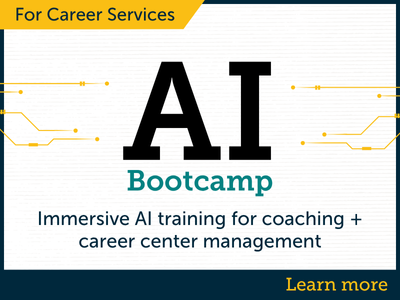Indiana University–Purdue University Indianapolis (IUPUI) launched its First Generation Student Success Campaign in 2022 to support and empower first-generation students in their career readiness.
As the first in their families to attend college, first-generation college students typically have fewer or no people in their network to help them navigate their college experience, including career readiness. In addition to this lack of support, first-generation students can face other systemic barriers, including financial burdens and inequitable access to resources.
NACE AWARD WINNER
Indiana University–Purdue University Indianapolis is the winner of the 2023 NACE/Chevron Award for its First Generation Career Connection Night as part of its First Generation Student Success Campaign. For more information about the NACE Awards program and the full list of award winners/honorable mentions, see www.naceweb.org/about-us/nace-awards/.NACE/Chevron Award sponsored by

“Our First Generation Student Success Campaign was developed in response to the fact that 30% of all IUPUI students are first generation and in recognition of IUPUI being designated as a First-Gen Forward Institution through NASPA in 2020,” says Karley Clayton, director of career services in IUPUI’s Luddy School of Informatics, Computing, and Engineering.
“The campaign aims to expand accessible career programming for first-generation students and enhance their sense of belonging on campus. Overall, the First Generation Student Success Campaign addresses the unique challenges and needs of first-generation students and helps them succeed in their academic and professional pursuits.”
The specific objectives of the First Generation Student Success Campaign include:
- Engaging with the IUPUI and Indianapolis community;
- Promoting a welcoming and inclusive campus climate;
- Enhancing first-generation students’ sense of belonging;
- Providing support and resources that reduce educational inequities; and
- Communicating IUPUI as a First-Gen Forward Institution, as recognized by the Center for First-Generation Student Success, an initiative of NASPA—Student Affairs Administrators in Higher Education and The Suder Foundation.
New Component Contributes to Campaign’s Success
One of the campaign’s key new components is the First Generation Career Connections Night, which is held during First Generation Week and in addition to the annual campus-wide First Generation Celebration.
“This event, which took place at the Indianapolis Zoo, was free and open to all first-generation undergraduate students from all majors,” says Kevin Lema, assistant program director, undergraduate career services in the Luddy School of Informatics, Computing, and Engineering.
“The First Generation Career Connection Night was a fun and innovative career-advancing opportunity in a unique venue. Students built and expanded their social capital through networking and dining with employers, getting individualized feedback on their resume and LinkedIn profile, and, overall, enhancing their professional and financial success post-graduation.”
The First Generation Career Connection Night incorporated two of the key elements that contribute to the First Generation Student Success Campaign’s success: its focus on identity-specific programming and its use of unique venues for events.
“By tailoring events and resources to the unique needs and experiences of first-generation college students, the program is able to provide targeted support that is both effective and meaningful,” Lema explains.
“Also, the unique venues help to create a memorable and engaging experience for students and employers. Holding the First Generation Career Connection Night at the Indianapolis Zoo helped to draw in students who may not have attended a more traditional career fair, which increased the program's reach and impact. It was a tangible way to address and foster support for the systemic barriers faced by first-generation students.”
Another catalyst for the campaign’s success is that it offers a variety of resources and opportunities for first-generation students, such as connection to campus resources and networking opportunities.
“By providing a range of support and programming, it is able to meet the diverse needs of first-generation students and help them achieve their goals,” Clayton notes.
Evolving and Expanding to for Greater Impact Across Campus Meet Students’ Needs
The First Generation Student Success Campaign continues to evolve and grow in its impact across the IUPUI campus. One significant change has been the recognition of the value of leveraging not only major-specific programming, but also affinity/identity to meet the unique needs of different student populations.
Lema says there have been more conversations among the career services council about identifying how to best support students through various initiatives and programming. In addition, the success of the First Generation Student Success Campaign has inspired the exploration of new initiatives, such as a Women in STEM Student Success campaign.
“The expansion of the program demonstrates a commitment to the success of all students, regardless of their backgrounds or identities,” he explains.
Collecting, Using Data to Guide Evolution, Demonstrate Effectiveness
The program has also collected data that helps guide its evolution. The First Generation Career Connections Night’s post-event survey revealed valuable insights. Overall, the event was very well received, with the top aspects being networking with employers and the zoo venue itself. Other results included:
- 100% of attendees gained confidence in attending networking events;
- 96% received feedback on their resume, elevator pitch, and LinkedIn profile;
- 95% reported increased awareness about IUPUI's resources for career readiness; and
- 100% of respondents would recommend the event to others.
Beyond the data, the First Generation Student Success Campaign’s effectiveness is evident in its continued expansion throughout the IUPUI campus. Individual departments and offices now hold events for students, faculty, and staff. Also, First Generation Day has become First Generation Week, allowing for a more comprehensive and impactful celebration of first-generation students and their achievements.
The program has garnered support from Indiana University President Pam Whitten, who empowered all seven IU campuses through a message celebrating first-generation faculty, staff, and students. President Whitten noted, “Across our state, IU has more than 18,000 first-generation students, each one poised to make a positive impact on our campuses, our communities, and their families for generations to come.”
Says Lema: “This support has enabled the program to receive additional consistent funding from the university, including potential funding from employer sponsors. These results demonstrate the significant impact of the program and the importance of accessible and inclusive career programming for first-generation students.”
“Through these efforts,” Clayton says, “IUPUI is working toward a more equitable and inclusive campus environment, where all students can thrive and achieve their career goals. The program's success has also helped to shift the culture of career development across campus, making it a shared responsibility among all departments and offices.”
Foundational Strategies for the Campaign
During the development, implementation, and maintenance of the First Generation Student Success Campaign, IUPUI staff have identified several foundational strategies:
- Collecting and analyzing data on an ongoing basis to inform program development and evolution. This includes assessing the needs and experiences of first-generation students, as well as tracking program outcomes and impact.
- Building strong partnerships across campus and leveraging existing resources to help expand the reach and impact of programming.
- Understanding the importance of creativity and innovation in engaging and supporting students. In addition, being responsive and adaptable to changing needs and circumstances is critical to program success.
- Advocating for and investing in first-generation students is important, not only through programming, but also through ongoing efforts to promote equity and inclusion across the university.
“Developing a program like the First Generation Student Success Campaign requires a campus-wide commitment to empowering first-generation students,” Lema points out.
“By implementing these strategies, we were able to create a program that supports first-generation students and fosters a culture of success and inclusivity on campus.”







